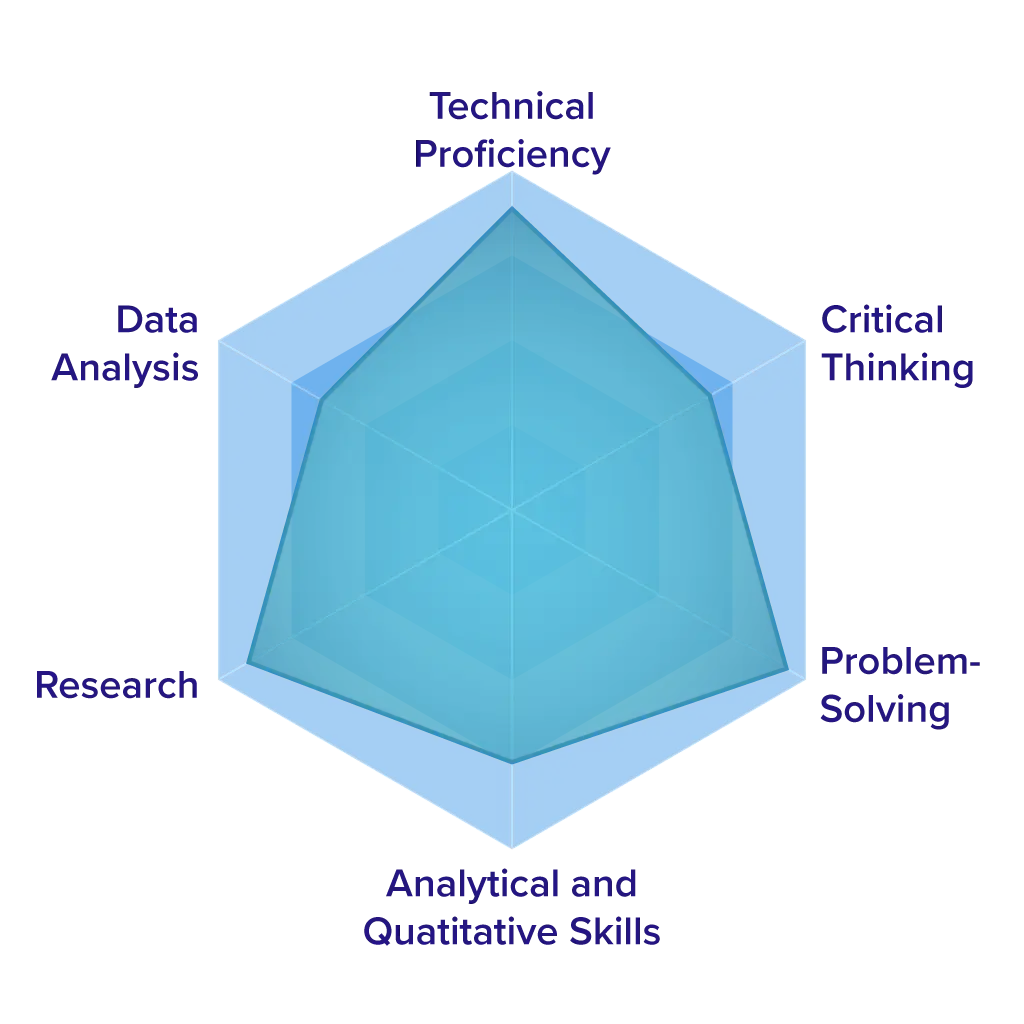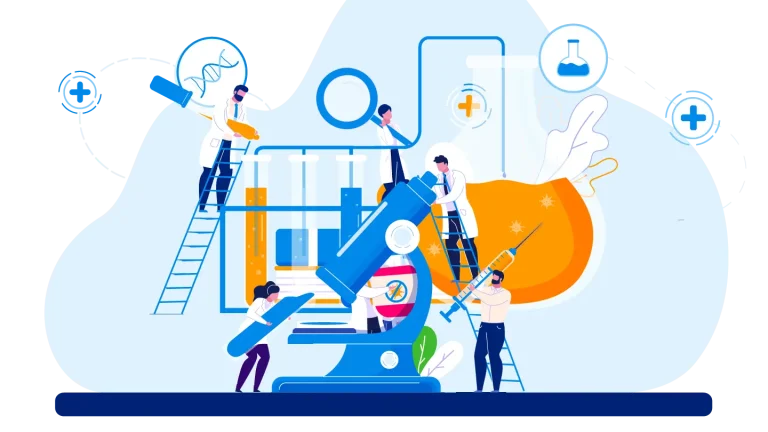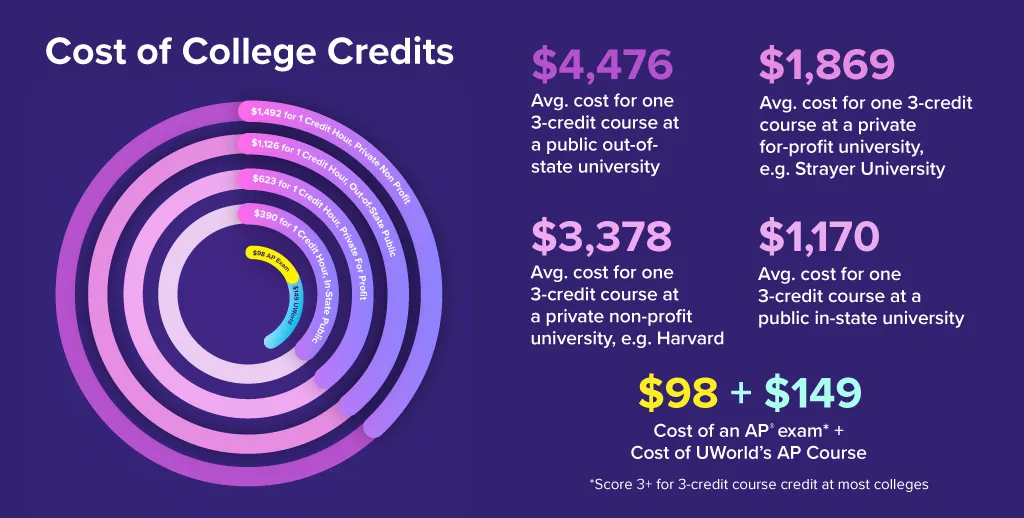Are you intrigued by how the world works, from the tiniest of atoms to mammoth space stations? If so, a STEM major is the perfect fit for you. Let’s explore how your AP® courses and ACT® and SAT® scores shape your college applications for a STEM major and explore career paths that might just be your calling.
Is a STEM Major Right for You?
Choosing a college major is a big decision; picking the right one can shape your career, passions, and overall life trajectory. In a world increasingly driven by technology and innovation, a STEM (Science, Technology, Engineering, and Mathematics) major promises intellectual exploration and opens doors to diverse and promising career opportunities. But how do you know if it’s the right 1 for you? Let’s dive in.
Understanding STEM
STEM encompasses a wide range of disciplines that revolve around scientific inquiry, technological innovation, and problem-solving skills. From the intricate mechanics of engineering to the frontiers of space exploration, STEM fields have emerged as the central driving force of progress. These fields are not just about theory; they focus on practical applications and innovations that profoundly impact the world. The major categories within STEM include:
| Science | It includes biology, chemistry, physics, and environmental science that explore natural phenomena and contribute to solving global challenges. |
| Technology | It includes computer science, information technology, cybersecurity, and AI, as well as creating tools and systems that advance industries. |
| Engineering | It includes disciplines, such as electrical, mechanical, civil, and aerospace engineering, that design and build infrastructure, machinery, and technology. |
| Mathematics | The study of numbers, statistics, data analysis, and applied mathematics underpins much of the work in other STEM fields. |
Why Choose a STEM Degree?
Opting for a STEM degree can offer a wealth of advantages, from job stability to the opportunity to make a significant contribution to society. Here are 5 compelling reasons why choosing a STEM degree may be the right choice for you:
- High Demand and Job Security
- Diverse Career Opportunities
- Attractive Salaries
- Creating a Global Impact
- Intellectual Stimulation and Growth
Average SAT and ACT Scores for Students Interested in STEM Majors
If you're considering a STEM major in college, it’s important to understand how your test scores play into the bigger picture. Preparing for a STEM career starts long before you declare a major—it begins with strong academic performance in high school, especially on college entrance exams like the SAT and ACT.
In fact, students who indicate a desire to major in STEM fields consistently earn some of the highest median SAT and ACT scores. That’s especially true at top-tier institutions like MIT and Stanford, where scores for STEM-intending students often fall in the 1420–1570 (SAT) and 32–35 (ACT) range. Even at a national level, students planning to study STEM generally score higher than average.
Average Scores by Major
| Intended College Major | SAT Median Total Score | ACT Median Composite Score |
|---|---|---|
| Biological and Biomedical Sciences | 1145 | 24.2 |
| Engineering | 1177 | 24.8 |
| Computer and Information Sciences | 1190 | 25.0 |
| Mathematics and Statistics | 1280 | 25.0 |
| Physical Sciences | 1211 | 24.2 |
Do Colleges and Universities Value AP Courses in STEM?
Colleges and universities highly value AP STEM courses because they show a student’s readiness for college-level work, especially in competitive fields like engineering, medicine, and computer science. Strong performance in these courses can boost admission chances, lead to college credit or advanced placement, and provide a solid academic foundation for STEM majors.
What Skills Do You Build in STEM Fields?
A STEM education helps you develop a wide range of skills that are essential in both college and your future career. These aren’t just academic strengths; they’re real-world tools that set you apart in any industry.

These skills aren’t just for STEM careers—they’re valued in everything from business to healthcare to public policy.
In-Demand Jobs for STEM Majors
Embarking on a journey with AP STEM is more than just an academic pursuit—it’s a gateway to innovation, discovery, and impactful careers. Below are some exciting professional opportunities aligned with popular STEM majors.
High Earning Potential Careers (Median salary above $110,000)
These careers typically require advanced degrees such as a Master’s, PharmD, PhD, or MD. They offer the highest median salaries and are ideal for students seeking significant long-term financial returns.
| Position Name | Role Description | Median Salary |
|---|---|---|
| Chief Technology Officer | Leads a company's technology and product development strategies. | $303,643 |
| Physician | Diagnoses and treats illnesses, often specializing in specific areas of medicine. | $220,189 |
| Electrical Engineer | Designs, develops, and maintains electrical systems and equipment. | $158,420 |
| Database Admin Manager | Oversees the performance, integrity, and security of databases. | $152,109 |
| Pharmacist | Prepares and dispenses medications, advising on proper drug usage. | $150,556 |
Moderate-to-High Earning Potential Careers (Median salary $75,000 - $110,000)
Most of these careers require a Bachelor's degree, though some may benefit from a Master’s. These roles offer strong financial outcomes and are perfect for students pursuing fast-growing, high-impact industries.
| Position Name | Role Description | Median Salary |
|---|---|---|
| Meteorologist | Studies weather patterns and climate to forecast weather conditions. | $108,984 |
| Nanotechnologist | Designs and manipulates materials at the molecular or atomic level for use in medicine, electronics, and more. | $106,000 |
| Aerospace Engineer | Designs and tests aircraft, spacecraft, and related systems and equipment. | $104,658 |
| Health Information Management Manager | Oversees the organization and security of medical records and health data. | $103,264 |
| Medicinal Chemist | Develops and tests chemical compounds for use in pharmaceuticals. | $102,219 |
Stable Earning Potential Careers (Median salary under $75,000)
These careers offer reliable income and often require a Bachelor's or Associate’s degree. They're a great entry point for students who want job stability and opportunities for growth.
| Position Name | Role Description | Median Salary |
|---|---|---|
| Environmental Specialist | Monitors the environment and develops ways to reduce pollution and waste. | $73,661 |
| Environmental Engineer | Designs solutions to environmental problems, including pollution control and waste management. | $73,661 |
| Web Developer | Designs and creates websites and web applications. | $72,949 |
| Sustainability Consultant | Advises organizations on strategies to reduce environmental impact and improve sustainability. | $72,750 |
| Systems Administrator | Maintains and supports an organization’s computer systems and networks. | $72,540 |
How Can AP Courses in STEM Benefit Future Career Prospects?
Enrolling in AP courses can do more than boost your GPA—it can jumpstart your entire career. These rigorous classes provide in-depth knowledge of science, technology, engineering, and math, helping students build a strong academic foundation for college.
Many AP STEM courses offer the opportunity to earn college credit or place out of introductory college courses. This can shorten the time it takes to earn your degree and reduce your overall tuition costs. These time and cost savings add up, giving students a more efficient and affordable pathway to their career goals.
Beyond academics, AP STEM courses teach transferable skills like critical thinking, problem-solving, collaboration, and communication—abilities valued in every professional field. Taking AP courses also shows colleges that you’re prepared for college-level work, which can strengthen your college application.
Ultimately, AP STEM will give you confidence, credentials, and clarity about where your interests can take you next.
Top AP STEM Courses for High School Students
Taking AP STEM courses in high school is one of the smartest ways to prepare for related college majors and career paths. These classes help you build essential skills, strengthen your college applications, and earn college credits, saving you time and money in the future.
If you're aiming for a STEM major or career path, here are some of the top AP courses to consider:
These courses will give you a solid foundation for the subjects you’ll encounter in college and help you stand out to college admissions committees.
The journey to a STEM career is an exciting endeavor full of wonderful possibilities. As you begin to make decisions about majors, SAT preparation, and your future career, we encourage you to consider this information as a steadfast guide, ushering in the clarity and confidence needed for your education and beyond. For additional assistance concerning the selection of a college major in STEM, check out College Board® website.
References
- Salary.com. (n.d.). Salary.com. Retrieved from https://www.salary.com/
- SAT Suite of Assessments Annual Report. (n.d.). Collegeboard.org. Retrieved from https://reports.collegeboard.org/media/pdf/2022-total-group-sat-suite-of-assessments-annual-report.pdf
- STEM Careers. Bestcolleges.com. Retrieved from https://www.bestcolleges.com/careers/stem/
- What AP Courses Should I Take For A STEM Major?. (n.d.). Chitowntutoring.com. Retrieved from https://chitowntutoring.com/what-ap-courses-should-i-take-for-a-stem-major/
- Which AP Courses Should I Take for a STEM Major?. (n.d.). Examcave.com. Retrieved from https://examcave.com/ap-courses-for-stem-major/
- STEM Learning. (n.d.). Collegeboard.org. Retrieved from https://apcentral.collegeboard.org/about-ap/start-expand-ap-program/build/stem-learning
- Connect AP to Majors and Careers. (n.d.). Collegeboard.org. Retrieved from https://apstudents.collegeboard.org/choosing-courses/by-major-career
- Student Score Distributions. (n.d.). Collegeboard.org. Retrieved from https://apcentral.collegeboard.org/media/pdf/ap-score-distributions-by-subject-2022.pdf
Related Articles
Unlock your humanities journey and strategically navigate AP courses and SAT scores to pave the way for success in your dream college major.
Business, Management, Marketing, and Related Support Services - AP CoursesExplore the perfect path to success in business, management, and marketing. Equip yourself with the right knowledge to unlock a world of career opportunities.
Health Professions & Related Clinical Sciences Major - AP CoursesMaximize success in health professions with the ultimate AP course roadmap. Uncover the perfect blend of AP courses for a thriving career in clinical sciences.
Social Sciences Major - AP CoursesExplore key AP courses for social science majors. Discover your strengths, develop real-world skills, and ace your college journey with confidence!









